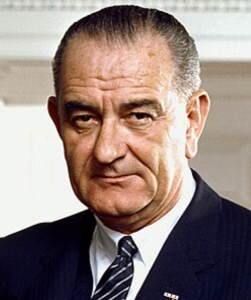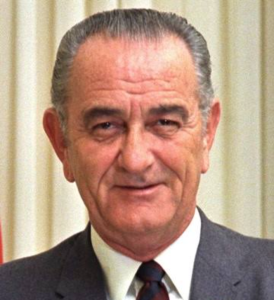
Lyndon B. Johnson Biography
Here is a full and detailed biography of Lyndon B. Johnson, the 36th President of the United States:
Full Name: Lyndon Baines Johnson
Born: August 27, 1908, in Stonewall, Texas, USA
Died: January 22, 1973, in Johnson City, Texas, USA
Age at Death: 64
Political Party: Democratic
Spouse: Claudia “Lady Bird” Johnson (married 1934)
Children: Lynda Bird Johnson Robb and Luci Baines Johnson
Education: Southwest Texas State Teachers College (now Texas State University), B.S. in Education
Military Service: U.S. Navy Reserve, Commander during World War II; awarded the Silver Star.
Early Life and Education
Lyndon B. Johnson was born into a modest farming family in the Texas Hill Country. His father, Samuel Ealy Johnson Jr., was a state legislator, and his mother, Rebekah Baines Johnson, was a teacher. Johnson graduated from Southwest Texas State Teachers College in 1930 and briefly worked as a teacher before entering politics.
Political Career
U.S. House of Representatives (1937–1949)
Johnson began his political career in 1937 when he was elected to the House of Representatives from Texas’s 10th district. He was a strong supporter of President Franklin D. Roosevelt’s New Deal policies.
U.S. Senate (1949–1961)
He was elected to the Senate in 1948 and quickly rose through the ranks. By 1955, he became Senate Majority Leader, known for his mastery of legislative strategy and political negotiation—skills that earned him the nickname “Master of the Senate.”
Vice President (1961–1963)
Johnson served as Vice President under John F. Kennedy from 1961 until Kennedy’s assassination in 1963. Though the role was largely ceremonial, Johnson remained active in legislative affairs.
Presidency (1963–1969)
Johnson became president on November 22, 1963, following Kennedy’s assassination. He was elected to a full term in 1964, defeating Republican Barry Goldwater in a landslide.
Major Achievements:
Civil Rights Act of 1964: Landmark legislation that outlawed segregation and discrimination based on race, color, religion, sex, or national origin.
Voting Rights Act of 1965: Protected the right to vote for racial minorities, especially in the South.
Great Society Programs: A sweeping set of domestic reforms aimed at eliminating poverty and racial injustice. These included:
Medicare and Medicaid
Head Start
Food Stamp Act
Elementary and Secondary Education Act
Public Broadcasting Act
War on Poverty: Aimed to reduce poverty through education, job training, and social welfare programs.
Immigration and Nationality Act of 1965: Abolished the national origins quota system, reshaping U.S. immigration policy.
Foreign Policy:
Vietnam War: Johnson escalated U.S. involvement in Vietnam, increasing troop levels dramatically. The war became deeply unpopular and overshadowed his domestic achievements.
Dominican Republic Intervention (1965): Sent U.S. troops to prevent a perceived communist takeover.
Later Life and Legacy
Johnson chose not to seek re-election in 1968, citing the toll of the Vietnam War and growing public unrest. He retired to his ranch in Texas, where he wrote his memoirs and reflected on his presidency.
He died of a heart attack on January 22, 1973, just four years after leaving office.
Legacy:
Johnson is remembered as one of the most effective and complex presidents in U.S. history.
Historians praise his domestic achievements, especially in civil rights and social welfare, but his legacy is deeply complicated by the Vietnam War.
Posthumously awarded the Presidential Medal of Freedom in 1980.

Lyndon B. Johnson Biography
Lyndon B. Johnson, the 36th President of the United States (1963–1969), left a profound legacy through his sweeping domestic reforms and civil rights legislation. Here are his most significant achievements in full detail.
The Great Society Program
Johnson’s signature domestic agenda, the Great Society, aimed to eliminate poverty and racial injustice. It included:
Medicare and Medicaid (1965): Provided health insurance to the elderly and low-income individuals.
Head Start: Early childhood education for disadvantaged children.
Food Stamp Act (1964): Expanded access to food assistance.
Economic Opportunity Act (1964): Created programs like Job Corps and VISTA to combat poverty.
Elementary and Secondary Education Act (1965): Increased federal funding for public schools, especially in low-income areas.
Higher Education Act (1965): Expanded college access through scholarships and low-interest loans.
Civil Rights Legislation
Civil Rights Act of 1964: Outlawed segregation in public places and banned employment discrimination based on race, color, religion, sex, or national origin.
Voting Rights Act of 1965: Prohibited racial discrimination in voting, especially targeting practices in the South that disenfranchised Black voters.
Civil Rights Act of 1968 (Fair Housing Act): Banned discrimination in housing sales and rentals.
Immigration Reform
Immigration and Nationality Act of 1965: Abolished the national origins quota system, allowing more immigrants from Asia, Africa, and Latin America and reshaping the demographic makeup of the U.S.
Environmental and Cultural Initiatives
National Endowment for the Arts (NEA) and National Endowment for the Humanities (NEH): Provided federal funding to support artists, writers, and scholars.
Clean Air Act (1963) and Water Quality Act (1965): Strengthened environmental protections.
Highway Beautification Act (1965): Championed by Lady Bird Johnson, it regulated billboards and promoted scenic preservation.
Judicial and Government Appointments
Appointed Thurgood Marshall as the first African American Supreme Court Justice in 1967.
Created new federal departments, including:
Department of Housing and Urban Development (HUD)
Department of Transportation
Space Exploration
Oversaw the Apollo space program, including Apollo 8, the first manned spacecraft to orbit the Moon in 1968, laying the groundwork for the Moon landing in 1969.
Foreign Policy and Vietnam War
Escalated U.S. involvement in the Vietnam War, increasing troop levels from 16,000 to over 500,000. Though controversial and damaging to his legacy, Johnson believed it was necessary to contain communism.
Initiated the Johnson Doctrine, asserting U.S. opposition to communist revolutions in the Western Hemisphere.
Despite the shadow of Vietnam, Johnson’s domestic achievements—especially in civil rights, healthcare, and education—cement his place as one of the most transformative presidents in American history.
